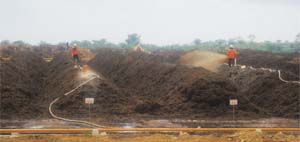COMPOSTING

PT. Sandabi Indah Lestari (SIL) is a private company which owns and operates 3,000 ha areas of palm plantation and a 30 ton fresh fruit bunches (FFB)/hour processing capacity of palm oil mill, located at Lubuk Banyau Village, Province of Bengkulu, Indonesia The project activity being developed by them is a waste management project in their palm-oil mill, which will avoid the emissions of methane to atmosphere through aerobic treatment of co-composting activities and proper soil application of the organic compost. In the palm oil mill, there are wastes during the processing of fresh fruit bunches into crude palm oil (CPO) processing, and most of them are palm oil mill effluent (POME) (65% of FFB) and empty fruit bunches (EFB)(23% of FFB)
1. Prior to the start of the implementation of the project activity, POME was treated in a standard waste water treatment system using 6 series of lagoons (ponds), comprising of anaerobic, facilitative and aerobic open lagoons, before being discharged to the nearby waterways or river. During the anaerobic treatment in the anaerobic lagoons, uncontrolled methane gas is generated and emitted to the atmosphere.
There is no methane gas capture or utilization facility installed in the mill or the plantation site.While, EFB was spread on the plantation for mulching, this is considered as an aerobic process.With the purpose to avoid the uncontrolled methane emission from anaerobic POME treatment in the anaerobic lagoons, this project activity utilizes POME together with EFB by using an aerobic co-composting technique. Composting is the aerobic decomposition of biodegradable organic matter, producing compost. Co-composting is the simultaneous decomposition of solid and liquid waste viz EFB and POME in the project activity. In the project activity, the EFB is chopped to small particle size using a shredder machine and then they are brought to composting floor where they are arranged into heaps called windrows. POME will be sprayed on the composting windrows and will be exposed to a large surface of EFB to maintain adequate moisture level. The windrows are turned periodically using a turning machine. This process is repeated everyday for 45 days and the compost is formed. The compost from this process will be used as an organic fertilizer in the palm-oil plantation replacing the inorganic fertilizer.
As the anaerobic treatment of POME is avoided by the project activity, methane generation is reduced. Moreover, the risk of river contamination from the discharge of treated POME will be eliminated. The baseline mulching process of EFB, as solid waste, is conservatively assumed to be aerobic and therefore the project activity only claims emission reductions related to avoided methane emissions from anaerobic treatment of POME.
